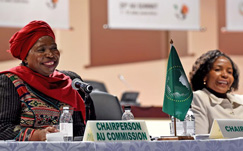Women at centre of African Union summit
12 June 2015
The African Union (AU) has stressed the importance of mainstreaming women in all
development activities as Africa seeks to attain integration, prosperity and peace
under its Agenda 2063 framework.
AU Commission chairperson Dr Nkosazana Dlamini-Zuma in her statement to the
opening session of the AU's Executive Council in Johannesburg yesterday, called for
the acceleration of gender transformation in order to achieve women's
empowerment and development towards Agenda 2063, which is the theme of the
African Union for 2015.
One of Agenda 2063's aspirations is to have an Africa in which development is
people driven, unleashing the potential of women and the youth. This year's theme
contributes directly to this aspiration.
"Women in Somalia, Central African Republic, eastern [Democratic Republic of
Congo], South Sudan, Darfur, northern Mali and northern Nigeria are yearning for
peace, for themselves, their children,
their families and communities, to live
normal lives, to plough their fields and to educate their children," Dlamini-Zuma
said, as she highlighted some of the challenges faced by women.
She also spoke of the need to consign the handheld hoe to the museum and to help
women with access to modern technology, land, credit, and extension services in
order to empower them in agriculture and agro industries.
To monitor progress in women's development, share best practices and hold each
other accountable, Dlamini-Zuma announced the launch of an African gender score
card at the AU summit, taking place in Johannesburg from 7 to 15 June.
Regional trade
She also highlighted the need for greater trade among African countries, which
remained low, saying the launch of negotiations for the African Continental Free
Trade Area, as well as other initiatives were aimed at growing trade between
African countries and creating wealth.
Speaking at
the same session, the representative of the host country, South Africa's
minister of international relations and co-operation, Maite Nkoane Mashabane,
declared that with "seven of the fastest growing economies in the world being in
Africa and the continent being the repository of a variety of resources, the time has
never been more opportune for Africa to achieve the things it wants".
Africa, she said, was on the move.
Nkoane Mashabane called on the Executive Council to process the work handed to it
by the Permanent Representatives Committee, which met on 7 and 8 June, and take
it forward to the heads of state and government.
"Through us, they [heads of state and government] must resolve not only the issues
of the implementation of Agenda 2063, but also the necessary resources to fund it
as well as matters pertinent to peace and security," said Nkoane Mashabane.
Africa must drive its agenda
Carlos Lopez, the under
secretary-general of the United Nations and the executive
secretary of the UN Economic Commission for Africa, spoke about the need for
Africa to consolidate its position in the world by ensuring that others "see and feel
what we are up to, and are aware of what we consider to be an imperative". He
urged African leaders to "make themselves seen and more importantly, felt" as
they drove the continent's development agenda.
Zimbabwe's minister of foreign affairs, who is also the chairperson of the Executive
Council, Simbarashe Mumbengegwi, highlighted the imperative of reviewing the
working methods and rules of procedure of the other organs of the AU in order to
enhance their efficiency and effectiveness in the discharge of their various
mandates.
Urging member states to seek alternative sources of financing the AU,
Mumbengegwi said it was important for Africa to ensure African control over and
ownership of the union and its programmes and
activities.
He commended the role played by the AU in the fight against Ebola.
The Executive Council meeting was the second of three statutory meetings to be
held during the on-going 25th AU summit. The first was that of the Permanent
Representatives Committee; the final will be that of the Heads of State and
Government on 14 and 15 June. It is this body, under its chairperson, President
Robert Mugabe of Zimbabwe, which will declare the final outcomes of the summit
and the way forward.
Source: African
Union
 African Union chairperson Nkosazana Dlamini-Zuma and Minister of International Relations and Co-operation Maite Nkaona-Mashabane at the Ministerial Retreat of the AU Summit, held in Johannesburg from 7 to 15 June 2015. (Image: GCIS)
African Union chairperson Nkosazana Dlamini-Zuma and Minister of International Relations and Co-operation Maite Nkaona-Mashabane at the Ministerial Retreat of the AU Summit, held in Johannesburg from 7 to 15 June 2015. (Image: GCIS)




